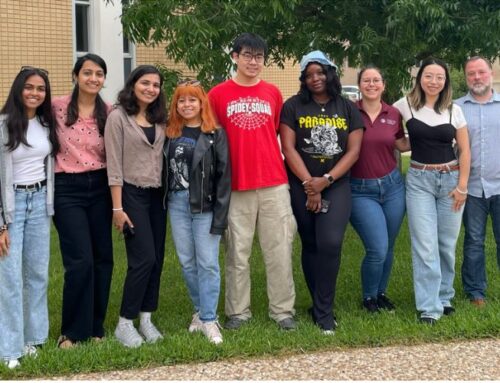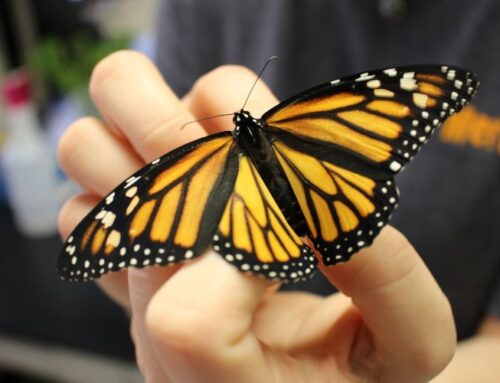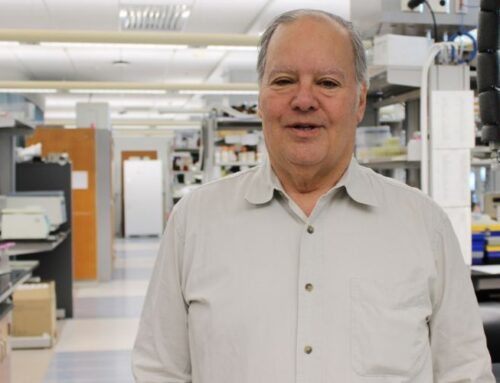Texas A&M Biologists Discover Key Regulator of Plant Defense Metabolites in Wild Tomato
By: TAMU Biology
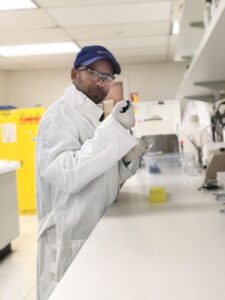
Sabyasachi Mandal
Dr. Sabyasachi Mandal, a postdoctoral associate in Thomas McKnight’s lab in the Department of Biology at Texas A&M University, has uncovered a critical genetic regulator of acylsugar biosynthesis, a class of specialized metabolites that protect plants from pests, pathogens, and environmental stress. Dr. Yohannes Rezenom from the Department of Chemistry at Texas A&M University and three undergraduate biology majors also contributed to this study.
Recently published in the peer-reviewed journal New Phytologist, the research identifies LEAFLESS (SpLFS), a member of the APETALA2/ETHYLENE RESPONSE FACTOR (AP2/ERF) transcription factor family, as a key regulator of acylsugar production in the wild tomato species Solanum pennellii. Acylsugars are naturally occurring compounds secreted by trichomes – tiny hair-like structures on plant surfaces – that serve as a first line of defense for many members of the Solanaceae family, including tomato, potato, eggplant, and tobacco.
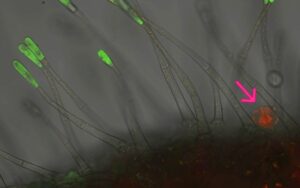 Using a combination of virus-induced gene silencing (VIGS), gene expression profiling, transcriptional reporter assays, and DNA-binding studies, the team demonstrated that silencing the SpLFS gene significantly reduced expression of multiple genes involved in acylsugar biosynthesis, and total acylsugar levels were reduced by up to 60 percent. Protective flavonoids, a class of compounds chemically distinct from acylsugars, were also reduced upon silencing SpLFS. The study also showed that the SpLFS protein directly binds to the promoters of multiple genes involved in both acylsugar and flavonoid biosynthesis, confirming its central role in regulating specialized metabolism in trichomes. Furthermore, their data mining also indicated amazing spatiotemporal switch in function for this transcription factor: from being involved in leaf development at the shoot apical meristem (SAM) with transient expression at the SAM to being involved in both trichome development and specialized metabolism with presumably constitutive expression in glandular trichomes.
Using a combination of virus-induced gene silencing (VIGS), gene expression profiling, transcriptional reporter assays, and DNA-binding studies, the team demonstrated that silencing the SpLFS gene significantly reduced expression of multiple genes involved in acylsugar biosynthesis, and total acylsugar levels were reduced by up to 60 percent. Protective flavonoids, a class of compounds chemically distinct from acylsugars, were also reduced upon silencing SpLFS. The study also showed that the SpLFS protein directly binds to the promoters of multiple genes involved in both acylsugar and flavonoid biosynthesis, confirming its central role in regulating specialized metabolism in trichomes. Furthermore, their data mining also indicated amazing spatiotemporal switch in function for this transcription factor: from being involved in leaf development at the shoot apical meristem (SAM) with transient expression at the SAM to being involved in both trichome development and specialized metabolism with presumably constitutive expression in glandular trichomes.

Thomas McKnight
Mandal et al. analyzed the version of the LEAFLESS gene in Nicotiana benthamiana, a wild tobacco species in the same botanical family as tomato and found similar effects on acylsugar production. These results suggest that the function of LEAFLESS orthologs are conserved across the Solanaceae family, highlighting its evolutionary significance and potential for cross-species applications in agriculture.
McKnight said, “Attempts to increase acylsugar production in cultivated tomato to provide increased protection against insect pests have had only modest success over the past 30 years. I am hopeful that our identification of this key regulator will allow genetic engineering approaches to succeed.”
This research not only advances fundamental plant biology but also has practical implications for sustainable agriculture, crop protection, and metabolic engineering. The article can be accessed here: https://nph.onlinelibrary.wiley.com/doi/10.1111/nph.70198



